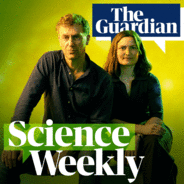Negotiators from around the world have landed in Montreal, Canada for the UN’s biodiversity conference, Cop15. The summit has been called an “unprecedented” opportunity for turning the tide on nature loss and comes at a critical time: a million species are at risk of extinction and wildlife populations have plunged by an average of 69% between 1970 and 2018. Madeleine Finlay speaks to the director of science at the Royal Botanic Gardens, Kew, Prof Alexandre Antonelli, about the current state of the planet’s biodiversity, what needs to be achieved at Cop15 and how he’s feeling about the possibility of change.. Help support our independent journalism at theguardian.com/sciencepod

Wissenschaft & Technik
Science Weekly Folgen
Twice a week, the Guardian brings you the latest science and environment news
Folgen von Science Weekly
300 Folgen
-
Folge vom 07.12.2022‘The biggest meeting for humanity’: Why Cop15 has to succeed
-
Folge vom 06.12.2022Why are children in the UK at risk of serious strep A infections?The UK Health Security Agency issued a rare alert on Friday, telling parents to look out for signs of strep A infection in their children. Since September, eight children in England and Wales have died after becoming unwell with Group A streptococci bacteria. Typically causing illnesses like skin infections, tonsillitis or scarlet fever, very occasionally strep A can become a life-threatening, invasive disease. But why are we seeing such a steep rise in cases in the UK this year? Madeleine Finlay speaks to Chrissie Jones, associate professor of paediatric infection at the University of Southampton, about the significance of this outbreak and the symptoms to be aware of, and asks Shiranee Sriskandan, professor of infectious diseases at Imperial College London, about how the bacteria can evade our immune systems and whether we may one day have a vaccine.. Help support our independent journalism at theguardian.com/sciencepod
-
Folge vom 01.12.2022‘A possible extinction event’: the UK’s worst bird flu outbreakThe UK is in the middle of its worst outbreak of bird flu. The current strain of H5N1 avian influenza has devastated wild bird populations, killing thousands and affecting threatened species such as puffins and hen harriers. Bird flu has also been wreaking havoc on poultry, and since 7 November, all captive birds in England have been kept indoors to prevent them catching the virus. How are both wild and captive bird populations coping with the current strain of avian flu? And is the UK prepared to deal with another major animal disease outbreak? Ian Sample speaks with Phoebe Weston, a biodiversity writer for the Guardian, and Paul Wigley, a professor in animal microbial ecosystems at the University of Bristol.. Help support our independent journalism at theguardian.com/sciencepod
-
Folge vom 29.11.2022What are leap seconds, and why have we scrapped them?At a recent conference in France, scientists and government representatives voted to scrap the leap second by 2035. Leap seconds are added periodically to synchronise atomic time and astronomical time, which get out of sync because of variations in the Earth’s rotation. Madeleine Finlay speaks to JT Janssen, the chief scientist at NPL, the National Physical Laboratory, about the differences between these two times, and what can go wrong when leap seconds are added to our clocks. Help support our independent journalism at theguardian.com/sciencepod
